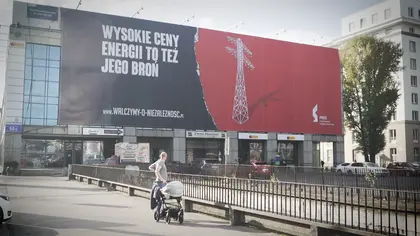If we are serious about dealing with Russia’s invasion of Ukraine, our measure of each nation’s economic success must exclude whatever they have derived from Kremlin gas.
The fact that Germany increased its gas dependence on Russia after Russia’s annexation of Crimea in the spring of 2014 should tell you all you need to know: the German powerhouse of the European Union believed it could not survive without Russia.
JOIN US ON TELEGRAM
Follow our coverage of the war on the @Kyivpost_official.
An honest impact assessment has never been attempted - but let’s consider a few facts we have before us, because getting one’s own house in order is prerequisite to projecting power outwards.
Germany is looked up to as the strength and stay of the EU because it is the strength and stay of the majority of member states’ currency - the Euro.
Germany derived its strength from having an industrial economy, from which it is able to export because manufacturing costs were kept low. Manufacturing costs were kept low by brokering a cushy energy deal with the Kremlin.
Referred to as "Wandel Durch Handel," for several decades, this scheme was sold to the German electorate with the idea that Germany could influence Soviet (later Russian) foreign policy by being a major customer for Russian gas.
Nobody was likely to question this, provided they received cheap energy. So, convenience became necessity, necessity became virtue and, as Germany’s industrial boom provoked forays into new technology and state sponsored research and development, Germany’s partners had no choice but to keep up and adopt the altarpieces of German aspiration, squeezing the productive parts of their fledgling industrial sectors to meet the gratuitous, protectionist, standards of European perfectionism.

Polish Support for Receiving Ukrainian Refugees Reaches New Low
When, to thunderous applause, the asbestos screen lifted over the stage of a United Europe, one can only imagine the stifled cries of dismay rising with the steam whistles of the Baltic; the sighs of tumbleweed through deteriorating Balkan warehouses; the whimpering of iron wheels in the industrial glades of Carpathia.
Eastern Europe’s industrial potential was nipped in the bud by lucrative grants for rarified R&D schemes. The lash of Communist Dictatorship replaced by the provender of Volksprotektorat without a free market in between.
As temperatures drop and inflation soars, we can all see where this has led. But there were some who resisted. Poland was Russophobic before it was cool, and their national currency remains resilient.
Indeed, the only thing that has frozen in Warsaw seems to be energy prices - an achievement which is down to Poland’s outright refusal to entirely trust either of its neighbors.
Until this year, the EU regarded Warsaw’s attitude as paranoid and truculent. Now they have had to backpedal extremely quickly. Europe’s one major industrial economy which does not depend on Russia also, quelle surprise, is in severe breach of Germany’s values.
"United in Diversity" is the reality of Russia and the aspiration of Germany, but piggy in the middle woke up and smelled the smalec (fat) before the butcher arrived.
While diversifying their energy sources with gas lines to Scandinavia and Romania, Poland obstinately refused to compromise its sovereignty by manipulating carbon-output figures.
If the EU is to stand as a global force distinct from Russia, we have to put our policy and aspirations where Poland’s strengths now are and, to do that, we have to be honest about our policy failures. Continued appeasement (because I think that is an acceptable term for Germany handing over EUR 25 billion a year to the enemy), does not just undermine our position with Putin, but degrades us on the World stage.
Russia prepared to wheel her deadliest strategist onto the battlefield: General Winter. Putin believed that as long as Germany struggles against the cold, any diplomacy with Russia will be viewed in light of Germany’s necessity for warmth, rather than Europe's grand narratives of justice.
The current warm winter has resulted in lower energy prices than expected, though the pockets of many Europeans are still hurting.
It is paramount that governments explain to voters that Putin is manipulating energy prices and spreading disinformation in Europe in an attempt to turn Europeans against giving further aid to Ukraine.
The Poles have been at the forefront of countering Putin’s hybrid warfare campaign.
The Minister of State Assets, Jacek Sasin, has orchestrated the defense. State-controlled energy companies pooled their resources and launched a giant information campaign with the help of the Polish Electricity Association.
The saturation campaign saw billboards plastering the streets, radio ads filling the airwaves and the printed press making sure that Poles of all ages are aware of the Kremlin’s nefarious plans.
In the short run, it costs Putin much less to put the squeeze on Western nations facing elections than it costs us to put the squeeze on Putin (our eco-lobby, green industry trade unions and voters howling with indignation).
The good news is that German, (and EU), leaders know this.
The bad news is that we have a job ahead of us to persuade voters to prioritise a war in a distant part of Europe over the cost of gas bills.
All Putin has to do (and he has shown willingness to do it), is squeeze the supply a little and the political narrative of least resistance will be that the war is responsible for raising energy prices.
This is only a half truth. Putin has utterly failed to raise energy prices in the EU nation most exposed to the Ukrainian conflict. Poland must be acknowledged as proof that soaring energy prices were avoidable and that, where Poland’s measures were not taken, expensive gas is as much the cost of yesterday’s failure as the price of tomorrow’s victory.
In the democratic mind of both voters and politicians, the price of "doing the right thing" should be picked up by the state, and not the individual.
But with tough times ahead, the price of appeasement is unavoidable - and Germany’s leaders are doing a noble job of directing attention to those countries which resisted the temptation to get themselves into this fix in the first place.
As German Foreign Minister Annalena Baerbock remarked, "Germany failed to listen to the warnings from countries that had once suffered under Russia’s occupation, such as Poland and the Baltic States."
But there’s still some way to go.
The most powerful partner in any relationship is the one who needs the other less and, no matter that Mother Russia is a decrepit, insane and violent pariah, Germany is still the national equivalent of a diabetic chain-smoker living in her basement, staring expectantly up through the bars as Poland arrives with both of their eviction orders.
Stefan Tompson is a Polish expert on the Three Seas Initiative and Central Eastern Europe. He has been working closely with Polish NGOs helping Ukrainian refugee children and working for closer Polish-Ukrainian relations in the wake of the Russian invasion.
The views expressed are the author’s and not necessarily those of Kyiv Post.
You can also highlight the text and press Ctrl + Enter






